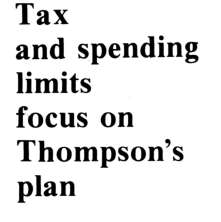

By JOHN E. WILLIAMS
Which tax reforms? That is the decision facing Illinois legislators. Almost every area of government finance could be modified by bills before the General Assembly. Several proposals deal with state taxing and spending limitations and limits or rollbacks on property taxes; others would make it harder to increase existing taxes or create new taxes. There are bills to provide voters with more information and control over taxes; bills which provide tax relief to homeowners and renters and tie the personal income exemption to the inflation rate. Finally, several bills would give special tax breaks to the elderly and disabled for the purchase of medicine, drugs and food.
The governor's plan
The one tax package most likely to focus debate belongs to Gov. James R. Thompson. Unveiled in his "State of the State" address March 7 to a joint session of the General Assembly, Thompson's plan is based on the premise that state and local governments are big enough and their future growth should be limited. At the same time, Thompson wants government to be responsive to citizens and deliver vital services.
Thompson's proposals rely heavily on the Governor's Advisory Commission on Taxes and borrow freely from existing bills. He did not specify what constitutional amendments he would seek, however. His proposals call for:
■ A limit on state spending from the general and road funds pegged to the rate of increase in the state's total personal income. Since personal income is already closely tied to revenue and spending in Illinois, this provision if enacted would not effect much change. Thompson believes that government shouldn't grow faster than personal income does. No matter how high revenues are, if the state's total personal income increases by 5 per cent, then the state's spending should only increase by 5 per cent, according to the Thompson proposal. Unspent state revenue would be channeled into two specific areas: retiring the state's bond debt and reducing accrued liabilities in the state's pension systems. A yet-to-be-defined escape clause would allow the state to exceed the limit in emergency situations.
■ A 2 per cent cash reserve of estimated available funds over and above the proposed general and road fund as a cushion against unforeseen expenses. Both the governor and the legislature would be required to budget this reserve.
■ An increase in the legislative votes needed to approve a state tax increase from a simple majority to a three-fifths majority. Tax increases failing to get a three-fifths vote, but approved by a simple majority of the legislature — and approved by the governor — would automatically be placed on a statewide referendum for the decision of voters. If three-fifths of those voting did not turn it down, the proposal would become law, according to the governor's proposal, which is more of a voters' veto than a ratification.
■ An increase from a simple to three-fifths majority vote to override a reduction veto of any spending bill. This would require an amendment to the state constitution.
■ Require the state to fully fund programs it mandates local governments to provide. If the state does not provide sufficient funds, local officials
could ignore requirements to the extent adequate state funding is not received.
■ Limit increases in property taxes to the growth of personal income. Local taxpayers would have the option to go beyond this limit if a higher rates approved by referendum.
■ Grant voters the opportunity to back any existing property tax rate up to 15 per cent every two years.
■ Require local government to conduct public hearings with sufficient warning whenever any increase in property" taxation is proposed.
Other tax packages
Prior to Thompson (finally) announcing his tax and spending proposals, others had already been proposed. Two comprehensive plans are the Tax-payers Rights Amendment sponsored by Rep. Donald Totten (R., Hoffman Estates) and a plan of the Illinois State Chamber of Commerce (ISCC). House minority leader George Ryan (
R., Kankakee) presented a package of bills dealing mainly with the property tax and the Public Action Council, a citi zens' taxpayers lobby, presented their plan, which attempts to reduce the tax burden. In contrast to Thompson's plan, both the Totten and ISCC plan
Continued on 27

